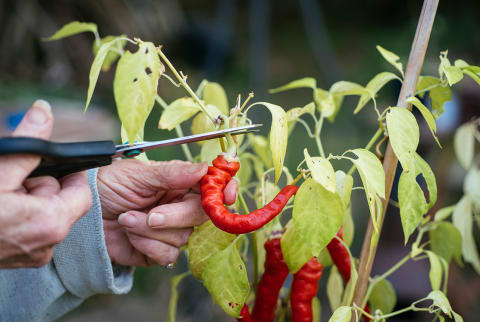Advertisement
How Capsaicin Can Increase Gut Microbiome Diversity (& Why That's A Really Good Thing)


It's no secret that a healthy diet can help support your gut microbiome—but have you ever considered consulting the spices in your pantry for a little extra support? A new study1 published in the journal Nutrients says that adding cayenne pepper to your regular cooking can make a significant impact due to one primary phytonutrient: capsaicin. In fact, researchers suggest that adding capsaicin "to the in vitro cultures of the gut microbiome" can increase the diversity of microbiota (good bugs) in the gastrointestinal tract. Here's why that's a good thing.
Health benefits of capsaicin.
Bolstering the microbiome2 of your gut is vital to its function: This is where cayenne pepper comes in.
Rich in the phytonutrient capsaicin, this cayenne pepper fruit and its extracts have historically been leveraged to aid proper digestion and for its antioxidant plus anti-inflammatory actions within the body.
More specifically, this recent study found "that capsaicin alters the gut microbial community structure by increasing the diversity of the community." Increasing the diversity of microbes in the gut "is a potential explanation for its beneficial health effects," the study adds.
What else you should know.
The study provides a promising display of the benefits of cayenne pepper in your regular diet. Since you can't study the GI tract in real time for long-term dietary interventions, an advanced in vitro model (like a mock gut) was used to conduct the research. This robust and validated method allows researchers to see and track the impacts of a targeted nutrition approach like capsaicin on gut microbial abundance and mix.
Other ways to improve the gut microbiome.
If you're not the biggest fan of spicy food, integrating a probiotic supplement into your day-to-day routine is another great way to elevate your gut microbiome and support digestion for a healthier body.* In fact, mbg's probiotic+ supplement offers four strains clinically shown to minimize bloat and aid proper digestion so your options aren't limited to cayenne pepper alone.*
The takeaway.
Cayenne pepper (and specifically its "MVP" phytonutrient capsaicin) can be an excellent addition to your regular meal plan, to help support your gut health, among other benefits. Your diet is intricately tied to your overall well-being, so eating ingredients that cater to certain functions will not only help you feel better in the short term but also support your body for years to come.
Watch Next
Enjoy some of our favorite clips from classes
Enjoy some of our favorite clips from classes
What Is Meditation?
Mindfulness/Spirituality | Light Watkins
Box Breathing
Mindfulness/Spirituality | Gwen Dittmar
What Breathwork Can Address
Mindfulness/Spirituality | Gwen Dittmar
The 8 Limbs of Yoga - What is Asana?
Yoga | Caley Alyssa
Two Standing Postures to Open Up Tight Hips
Yoga | Caley Alyssa
How Plants Can Optimize Athletic Performance
Nutrition | Rich Roll
What to Eat Before a Workout
Nutrition | Rich Roll
How Ayurveda Helps Us Navigate Modern Life
Nutrition | Sahara Rose
Messages About Love & Relationships
Love & Relationships | Esther Perel
Love Languages
Love & Relationships | Esther Perel
What Is Meditation?
Box Breathing
What Breathwork Can Address
The 8 Limbs of Yoga - What is Asana?
Two Standing Postures to Open Up Tight Hips
How Plants Can Optimize Athletic Performance
What to Eat Before a Workout
How Ayurveda Helps Us Navigate Modern Life
Messages About Love & Relationships
Love Languages
Advertisement

Want To Be Metabolically Healthy? New Study Shows An Underutilized Approach
Molly Knudsen, M.S., RDN

Bounce Back Quickly After Workouts With This DIY Electrolyte Drink
Molly Knudsen, M.S., RDN

Want To Be Metabolically Healthy? New Study Shows An Underutilized Approach
Molly Knudsen, M.S., RDN

Bounce Back Quickly After Workouts With This DIY Electrolyte Drink
Molly Knudsen, M.S., RDN














